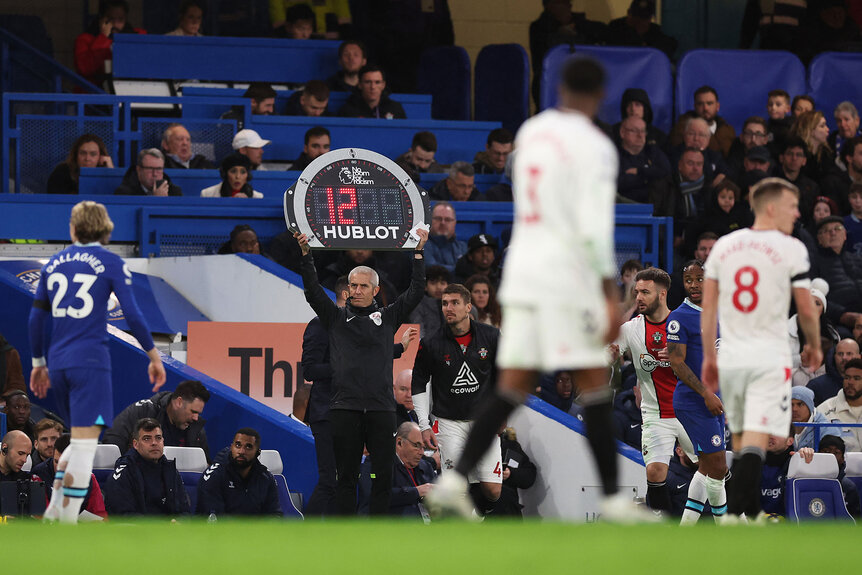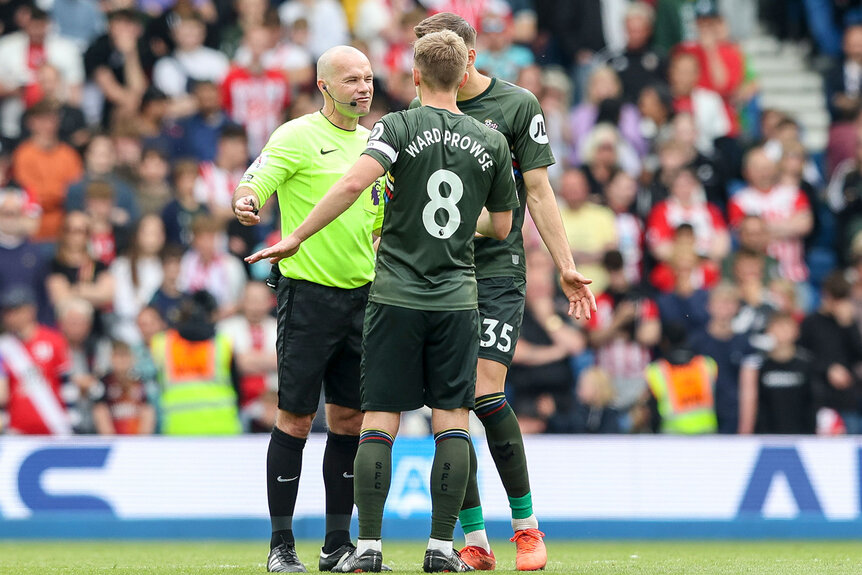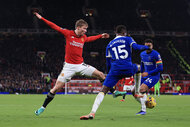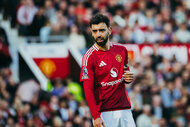What are the Rule Changes for the Premier League in 2023/24?
While fans will notice some new faces around the league, perhaps the biggest changes this season are to the Premier League rulebook.

After a successful run of the inaugural Premier League Summer Series in the U.S., footy fans’ hunger for more action from England’s top flight has only intensified.
The good news is, the Premier League officially kicks off on the USA Network Friday with Pep Guardiola’s Treble-winning Manchester City squad of Erling Haaland and company taking the pitch as they welcome newly-promoted Burnley to the Premier League.
RELATED: Where to Watch the Premier League: Matchweek 1
The wait is over, and the players are primed for competition, but — due to some changes to the league’s rules — the action could feel a little different. From tightening the reins of time-wasting to more penalties issued for bad behavior, here’s a look at some of the biggest new rules and what they mean for the most elite football league in the world.
Offside and "Deliberate Play"
The Premier League has done its best to tackle the perpetually controversial element of offside by integrating VAR (video assistant review), but, despite its benefits, it’s also created plenty of headaches, even landing multiple officials in hot water after the system failed to accurately identify multiple offside issues last year.
Ahead of the 2023/2024 season, league brass again tried to address the offside issue and remedy some problematic areas. Their efforts align the Premier League with both the IFAB and FIFA in terms of this latest update that focuses on the "deliberate play" by a defender when a player on attack is called offside.
According to The Sporting News, if match officials deem a defender to be in control of the ball with the ability to either pass to a teammate or clear the ball, an attacking player situated in an offside position would not be penalized despite technically being offside. Furthermore, if the defender makes an inaccurate move such as a poor clearance, the new rule doesn’t change as it’s still considered a "deliberate" attempt to play the ball.
Adjustments to Timekeeping and Injury Time
After footy fans first experienced clock adjustments in the men’s World Cup in Qatar, extending the matches several minutes with additional stoppage time, English football was next to experiment with timekeeping when the English Football League Championship (EFL) opened last weekend. Out of all the matches, only two failed to reach 100-minute threshold. Now, it’s the Premier League’s turn.
As ESPN reports, orchestrated by the football lawmakers of the IFAB, the new timekeeping adjustments are derived from an effort to increase "effective playing time," which refers to how long the ball is in play. Premier League Referees chief Howard Webb notes that effective playing time has been steadily declining year after year with the EPL yielding only 54 minutes of it last year.
RELATED: NFL Legend Tom Brady Becomes Minority Owner of Premier League Hopefuls Birmingham City
"We saw that the World Cup utilized a different methodology, which clearly was seen as successful by FIFA,” Webb said, according to ESPN. "We're asking [referees] to apply exact amounts of time; for goals that are scored from the moment the goal is scored until the restart, when substitutions happen we're asking them to add on the time that takes in totality rather than just a rule-of-thumb 30 seconds like has traditionally been the case.”
"Alongside that is an approach whereby we are asking the officials to be proactive in getting the game restarted, not just standing by and letting the time tick up, or add up, and also dealing with players who delay the game, who waste time, and to do that in a more consistent way than we might have done in the past."
Webb notes that there will be a learning curve for both players and officials as the aim is to not keep players running nonstop.
"I think things will settle down a bit, players will realize that if they do waste time, they are going to be caught, and that will lead to a modification in player behavior, so there will be less time wasted," Webb added. "We'll see the amount of time that goes on the board come down because of that. We'll see officials being more proactive to ensure the game restarts, again we're changing mentalities and actions across the board.
Last year, the Premier League saw an average addition of 8.5 minutes to match play, and Webb believes this new methodology for tamping down time-wasting as it applies to goals and celebrations, injuries, substitutions and penalties could raise that number by as much as three minutes. This will also apply to violations of tactical time-wasting, such as anyone who acts deliberately to cause a delay will be penalized.
Teams Will Now be Punished for Surrounding a Referee
In recent years of the Premier League, the image of multiple players aggressively protesting a ref’s decision by surrounding that official has, unfortunately, become an all-too familiar sight. Now, according to the Premier League site, the Participant Charter, which is a strict new code of conduct, has been developed with the League Managers Association and the Professional Footballers’ Association to stymie that and any future copycat behavior.
RELATED: The 10 Most Valuable Football Clubs in the World in 2023
On a macro level, by empowering officials to take action through the issuing of yellow or red cards when poor behavior demands it, the goal is to modify how players react to officials and increase respect for them as illustrated in other sports. The league believes this will help protect the sanctity of the sport and its reputation while setting a good example for footballers at any level. Repeat and egregious offenders of this new policy will incur hefty financial penalties as a result.
Changing the Interpretation of Denying a Clear Goalscoring Opportunity
The modifications here apply specifically to when players commit a foul inside their own penalty area in an attempt to deny an opposing player a clear goalscoring opportunity. Other sports such as basketball employ a similar strategy on fouls committed when there is clear path to the basket.
As it applies to the Premier League, The Sporting News reports that the offending player will now be given a yellow card whether or not the foul was a true attempt to play the ball or just to challenge the opposition for it. Like the issue with teams surrounding refs in protest of a disputed call, the aim is to ultimately empower game officials. League brass want to see refs use their discretion to issue yellow cards over reds, reserving the latter for more severe incidents.
Watch Premier League coverage on USA Network, featuring Premier League Mornings, select matches, and Premier League Goal Zone (check listings for games/schedule). And catch up on all the action on Peacock.















